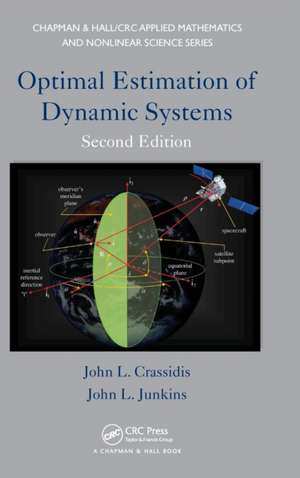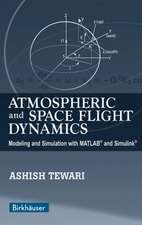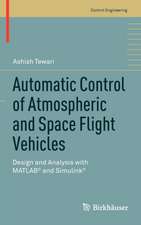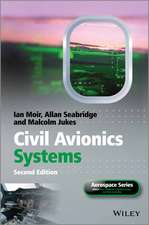Optimal Estimation of Dynamic Systems: Chapman & Hall/CRC Applied Mathematics & Nonlinear Science
Autor John L. Crassidis, John L. Junkinsen Limba Engleză Hardback – 26 oct 2011
| Toate formatele și edițiile | Preț | Express |
|---|---|---|
| Paperback (1) | 358.89 lei 6-8 săpt. | |
| CRC Press – 14 oct 2024 | 358.89 lei 6-8 săpt. | |
| Hardback (1) | 1285.41 lei 3-5 săpt. | +48.14 lei 4-10 zile |
| CRC Press – 26 oct 2011 | 1285.41 lei 3-5 săpt. | +48.14 lei 4-10 zile |
Preț: 1285.41 lei
Preț vechi: 1412.54 lei
-9% Nou
246.04€ • 267.35$ • 206.81£
Carte disponibilă
Livrare economică 01-15 aprilie
Livrare express 15-21 martie pentru 58.13 lei
Specificații
ISBN-10: 1439839859
Pagini: 750
Ilustrații: 117 black & white illustrations, 40 black & white tables
Dimensiuni: 156 x 234 x 38 mm
Greutate: 1.24 kg
Ediția:Revizuită
Editura: CRC Press
Colecția Chapman and Hall/CRC
Seria Chapman & Hall/CRC Applied Mathematics & Nonlinear Science
Locul publicării:Boca Raton, United States
Public țintă
AcademicCuprins
Least Squares ApproximationA Curve Fitting Example
Linear Batch Estimation
Linear Sequential Estimation
Nonlinear Least Squares Estimation
Basis Functions
Advanced Topics
Probability Concepts in Least Squares
Minimum Variance Estimation
Unbiased Estimates
Maximum Likelihood Estimation
Cramer-Rao Inequality
Constrained Least Squares Covariance
Maximum Likelihood Estimation
Properties of Maximum Likelihood Estimation
Bayesian Estimation
Advanced Topics
Sequential State Estimation
A Simple First-Order Filter Example
Full-Order Estimators
The Discrete-Time Kalman Filter
The Continuous-Time Kalman Filter
The Continuous-Discrete Kalman Filter
Extended Kalman Filter
Unscented Filtering
Constrained Filtering
Advanced Topics in Sequential State Estimation
Factorization Methods
Colored-Noise Kalman Filtering
Consistency of the Kalman Filter
Consider Kalman Filtering
Decentralized Filtering
Adaptive Filtering
Ensemble Kalman Filtering
Nonlinear Stochastic Filtering Theory
Gaussian Sum Filtering
Particle Filtering
Error Analysis
Robust Filtering
Batch State Estimation
Fixed-Interval Smoothing
Fixed-Point Smoothing
Fixed-Lag Smoothing
Advanced Topics
Parameter Estimation: Applications
Attitude Determination
Global Positioning System Navigation
Simultaneous Localization and Mapping
Orbit Determination
Aircraft Parameter Identification
Eigensystem Realization Algorithm
Estimation of Dynamic Systems: Applications
Attitude Estimation
Inertial Navigation with GPS
Orbit Estimation
Target Tracking of Aircraft
Smoothing with the Eigensystem Realization Algorithm
Optimal Control and Estimation Theory
Calculus of Variations
Optimization with Differential Equation Constraints
Pontryagin’s Optimal Control Necessary Conditions
Discrete-Time Control
Linear Regulator Problems
Linear Quadratic-Gaussian Controllers
Loop Transfer Recovery
Spacecraft Control Design
Appendix A: Review of Dynamical Systems
Appendix B: Matrix Properties
Appendix C: Basic Probability Concepts
Appendix D: Parameter Optimization Methods
Appendix E: Computer Software
Index
A Summary appears at the end of each chapter.
Notă biografică
John L. Crassidis, Ph.D., is a professor of mechanical and aerospace engineering and the associate director of the Center for Multisource Information Fusion at the University at Buffalo, State University of New York. He previously worked at Texas A&M University, the Catholic University of America, and NASA’s Goddard Space Flight Center, where he contributed to attitude determination and control schemes for numerous spacecraft missions.
John L. Junkins, Ph.D., is a distinguished professor of aerospace engineering and the founder and director of the Center for Mechanics and Control at Texas A&M University. In addition to his historical contributions in analytical dynamics and spacecraft GNC, Dr. Junkins and his team have designed, developed, and demonstrated several new electro-optical sensing technologies.
Recenzii
A nice feature of this book is that it makes the effort to explain the underlying principles behind the formula for each algorithm; the relationship between different algorithms is equally well addressed. … The text is a good combination of theory and practice. It will be a valuable addition to references for academic researchers and industrial engineers working in the field of estimation. It will also serve as a useful reference for graduate courses in control and estimation.
—AIAA Journal, Vol. 43, No. 1, January 2005
Descriere
Optimal Estimation of Dynamic Systems, Second Edition highlights the importance of both physical and numerical modeling in solving dynamics-based estimation problems found in engineering systems. Accessible to engineering students, applied mathematicians, and practicing engineers, the text presents the central concepts and methods of optimal estimation theory and applies the methods to problems with varying degrees of analytical and numerical difficulty. Different approaches are often compared to show their absolute and relative utility. The authors also offer prototype algorithms to stimulate the development and proper use of efficient computer programs. MATLAB® codes for the examples are available on the book’s website.
New to the Second Edition
With more than 100 pages of new material, this reorganized edition expands upon the best-selling original to include comprehensive developments and updates. It incorporates new theoretical results, an entirely new chapter on advanced sequential state estimation, and additional examples and exercises.
An ideal self-study guide for practicing engineers as well as senior undergraduate and beginning graduate students, the book introduces the fundamentals of estimation and helps newcomers to understand the relationships between the estimation and modeling of dynamical systems. It also illustrates the application of the theory to real-world situations, such as spacecraft attitude determination, GPS navigation, orbit determination, and aircraft tracking.



















